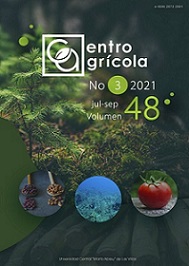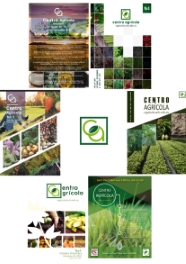CE:0117 CF: cag013172130
RESEARCH ARTICLE
In vitro antifungal activity of Citrus spp. leaves extracts against Stemphyllium solani Weber
Actividad antifúngica in vitro de extractos de hojas de Citrus spp. frente a Stemphyllium solani Weber
Dianella Iglesias1, Katia Ojito-Ramos1, Claudia Linares Rivero2 y Orelvis Portal1
1Departamento de Biología, Facultad de Ciencias Agropecuarias, Universidad Central "Marta Abreu" de Las Villas, Carretera a Camajuaní km 5 ½, Santa Clara, Cuba. CP 54830
2Centro de Bioplantas, Universidad de Ciego de Ávila "Máximo Gómez Báez", Carretera a Morón km 9 ½, Ciego de Ávila, Cuba.CP 069450
E-mail: This email address is being protected from spambots. You need JavaScript enabled to view it.; This email address is being protected from spambots. You need JavaScript enabled to view it.; This email address is being protected from spambots. You need JavaScript enabled to view it.; This email address is being protected from spambots. You need JavaScript enabled to view it.
ABSTRACT
Tomato is a horticultural crop with high acceptance worldwide, which is affected for several pathogens in those who find Stemphyllium solani Weber, responsible for the gray leaf spot. The control of this disease is based on application of chemical fungicides, which increase production costs and cause pollution to the environment, so the search for methods of agro-ecological control is necessary, as is the use of plant extracts. The aim of this work was to determine the " in vitro " antifungal activity of Critus spp. extracts against S. solani . The extracts were obtained by ultrasonic assisted extraction and then the total phenols content was quantified. For each extract was established the minimal inhibitory concentration, and then was determined the percentage of inhibition of micelial growth and the percentage of inhibition of conidial germination. In all extracts were obtained concentrations of totals phenols highest than 36 mg equivalent to galic acid mL-1 of extracts. The ethanolic extract of Citrus aurantium var . sinensis (L.) Osbeck showed the lowest minimum inhibitory concentration against S. solani . The tested extracts, except C. aurantium L. in ethanol, showed percentages of inhibition of mycelial growth of S. solani of 100 %. However, only the extracts of C. aurantium var. s inensis in ethanol and Citrus reticulata Blanco in methanol showed percentages of inhibition of conidial germination of 100 %, so they were selected as the most effective in the in vitro control of S. solani.





